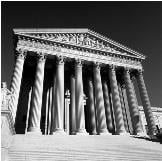Bonuses for Lawyers
Supreme Court backs bonuses for lawyers' public interest work
 A group of public interest lawyers learned Wednesday that the Supreme Court giveth, and the Supreme Court taketh away.
A group of public interest lawyers learned Wednesday that the Supreme Court giveth, and the Supreme Court taketh away.
On the one hand, all nine members of the court decided that civil rights lawyers who achieve extraordinary results on behalf of the dispossessed are entitled to a bonus for their good work.
On the other hand, five of the justices were not convinced that a children's rights group and a private law firm, which together won a transformation of Georgia's dysfunctional foster-care system, deserved the $4.5 million bonus they received from the federal judge who oversaw the case. The majority sent the case back for another review of whether the lawyers should get that much.
The Supreme Court often reviews the work of lawyers who have done their job poorly. But in this case, the question was how to encourage public interest lawyers and private law firms to take on poor clients or those pressing civil rights claims, and how to reward those who do.
Federal law allows lawyers who prevail in such cases to recover their fees. U.S. District Judge Marvin H. Shoob calculated the work done by the group Children's Rights and Atlanta's Bondurant, Mixson & Elmore law firm over the eight years of the suit and ordered the state of Georgia to pay them $6 million. He also awarded them a bonus of 75 percent, bringing the total to $10.5 million.
Shoob said the lawyers displayed a "higher degree of skill, commitment, dedication and professionalism" than he had seen in decades on the bench. He added that, in "58 years as a practicing attorney and federal judge, the court is unaware of any other case in which a plaintiff class has achieved such a favorable result on such a comprehensive scale."
Georgia balked at paying the multimillion-dollar bonus and appealed, saying neither federal law nor Supreme Court precedent allowed such "enhancements."
The winning lawyers in the case were supported at the Supreme Court by an array of liberal and conservative public interest groups, but Wednesday's decision divided the justices into familiar ideological camps.
The conservative majority said in an opinion written by Justice Samuel A. Alito Jr. that Shoob "did not provide proper justification for the large enhancement that [he] awarded." Alito said Shoob's decision to increase the fee by 75 percent was "essentially arbitrary" and called his judgment that the lawyers deserved a bonus "impressionistic."
Alito said it should be presumed that the base rate is adequate compensation. In the "rare" cases in which it is not, it is up to the lawyers asking for extra money to justify the request, and up to judges to meet specific guidelines in awarding the bonus.
Alito said the federal law that requires reimbursement makes it "possible for persons without means to bring suit to vindicate their rights. But unjustified enhancements that serve only to enrich attorneys are not consistent with the statute's aim." He was joined by Chief Justice John G. Roberts Jr. and Justices Antonin Scalia, Anthony M. Kennedy and Clarence Thomas.
Justice Stephen G. Breyer complained that the majority should have decided only the question that prompted the case -- are enhancements allowed? -- and left it up to Shoob to pass judgment on how the lawyers had performed.
Breyer noted the years of work spent on the case, the complexity of the litigation and the reforms implemented by the state because of the suit.
"If the facts and circumstances that I have described are even roughly correct, then it is fair to ask: If this is not an exceptional case, what is?" Breyer wrote. He was joined by the court's liberals, Justices John Paul Stevens, Ruth Bader Ginsburg and Sonia Sotomayor.
(Published by The Washington Post - April 22, 2010)